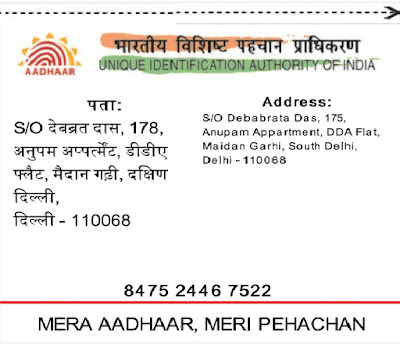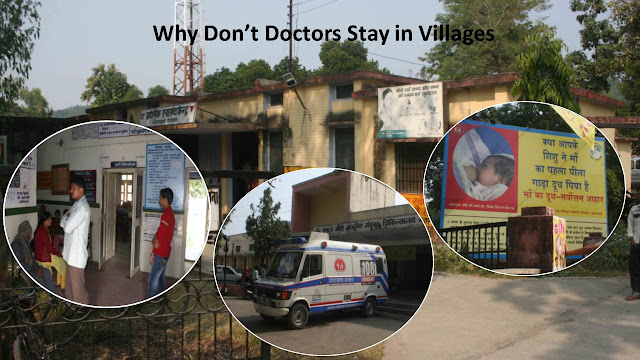The Panic of Proof
Nowadays one is often faced with the smug opinion "What is the big deal, why this big hue and cry about CAA? Citizens of India have nothing to fear." Most people making this observation are sitting in comfort and in the security of their own homes and other middle class privileges. Homes they are either paying EMI for or may have been handed down from the earlier generation. There is no such security among the poor. The young woman who comes to clean in our house shared that her father in Medinipur was uncertain because they had been settled by the local landlord and they were originally weavers from Odisha. Also, his name had been wrongly written as Ramakrishna in their Aadhar Card while he was actually Radhakrishna and known as such in the community.
We know that in Assam
the gaps in the documentation and mismatch in proof of identification and
residence has not only made thousands of people un-citizens overnight but sent
many people to detention centres. But the choas in sarkaari documentation is
not a rare phenomenon nor is it unique to Assam. As a migrant and local
resident in many places and many homes over the last thirty plus years I have
had to face this problem many times over.
Getting a gas
connection in the late eighties in UP was mighty difficult. When we went for
our first independent connection in Varanasi we were told that we would have to
wait for a few years. But a colleague had someone she knew who ran the local
gas agency and we were informed that while a new connection was not possible a
transfer would be immediate. So I asked my mother to enquire at our Kolkata gas
agency whether I could get a new connection in my name. I was told I could, but
I would need to buy a chullah. Having no other option we bought the chullah
which we didn't need and deposited the full cylinder immediately after taking
delivery and got ourselves the required transfer certificate. Now why am I
giving you the long details of getting my first gas connection? What does this
have to do with the documentation story? I beg your indulgence for a few more
lines.
You can well
imagine that this was a very valuable gas connection and we learnt that the
transfer certificates are the only way to any assured gas connection when we
move. But as the connection moved from a more English proficient Kolkata to a more
English averse rural hinterland of UP, my name on the gas papers were now written
in Hindi. In between moving from Varanasi to Mukteswar to Almora to Lucknow somehow
my name got changed to अभयजीत (Abhayjeet) in Hindi and I did not really
notice. I had in between even managed to get a DBC or Double Bottle Connection
in the name of this Abhayjeet. But that was before the days of rigorous ID and
residence proofs, and any way I had the recommendation of a senior IAS officer
so who dare ask. But now we were transferring the connection to Delhi and back
into the land of English. The transfer certificate from Lucknow was made out in
English for a certain Abhayjeet Das and when I brandished it before the local gas
agency I was asked for my ID proof. I flashed my ID – if I remember correctly
it was my PAN card. It was by now 20 years since I had my connection and I was
faced with the question – ‘par sar yeh naam to nahi match kar raha hai’ ( Sir your
names don’t match). I tried explaining to them that listen to the sounds of the
two words? Can’t you make out the similarity? The name has been changed in the
process of translation from English to Hindi to English. The clerk at the
agency was polite and smiled. “Samajh rahen hain sar, par main kuch nahi kar
sakta. ( I understand but there is nothing I can do.) You have to get it
changed from the Indian Oil authorities was the advice I was given.
Thankfully with all my middleclass networks it was not difficult to find
the ‘connection’. A close colleague’s brother in law worked in IOL and promised
that she would put in a request. Equipped with his mobile number I went to the IOL
office and got him to refer me to the person who could authorise the change in
name with a signature and a seal on my old transfer certificate and I could
heave a sigh of relief! This very valuable connection served us for the next ten
years in Delhi but is not being used more because of piped gas.
In a similar way the first voter ID card that I got many many years ago in
Almora when the picture was taken by a Panasonic video camera and my mug shot
came out looking like someone from a ‘Wanted’ poster I found my dear departed
father’s name was written as Devgrith Das. His name was Debabrata Das but in
the process of converting an unfamiliar name (in the Almora context) the poor
clerk had made judgements which completely unmade my father’s identity. If I needed
to prove anything about myself using that identity card I could be in a serious
soup right now.
These two incidents refer to some time in the hoary past when the pen was
mightier than technology but also highlight how India is a country with multiple
linguistic realities and the link language of English can play games as many users
who are not familiar in the language or in the translations they are responsible
for often interpret information including sounds related to names and places in
their own unique ways. And India with its rich diversity is not limited to a
set of common names and surnames – like Tom, Dick and Harry or the Joan, Jill
and Mary. Even the ‘jit’ of my name Abhijit is often spelt ‘jeet’ even by very
accomplished people replying to my mail where I have clearly signed myself as Abhjit.
And I am sure the ‘Athuls’ and ‘Vineeths’ of India have to constantly face the embarrassment
of being addressed as Atul and Vineet in written communication by people who know
them well.
But my story of anxieties over bureaucratic confusion doesn’t end here. Five
years ago, I was in a desperate need to change my address on my Aadhar Card. We
had been shifting flats within the same DDA apartment complex and we had
surmised that we could get by without changing our Aadhar card because the
earlier address was twenty feet away and every one including the postman and
the new residents knew where the deliveries needed to be done if they were in
our name. My complacency was shattered when I went to get a pre-paid International
Card for our daughter when she was going
abroad. The Bank authorities were very cordial and said it would be a smooth
transfer from my account to her new account, but they needed to verify our
address first. I told them please do come to our house and that is not a
problem but there is a small problem the address proof says 157 but we live in
175 which is just across a fifteen feet road and both flats were on the ground
floor. The bank official shook her head very solemnly. “Sir, that’s not
possible. We can accept your address proof.” I asked, “Why don’t you come and
you will see its all just a matter of ten feet this way and that.” She was
adamant “We can’t accept your proof of address even when if we see you ten feet
away from the address on your address proof.” Actually, sir I also need a KYC on your other
account and I would advise that you close that account as well and we will make
a draft and give you the money.” While on one hand I admired the fact that she
was sticking to the rule of law even though it meant losing business, I cursed
the inflexible system.
Now I was keen to get myself the correct address proof so I enquired how
this could be done and realised that it was easy if you had registered your
mobile number with your Aadhar Card. On checking on the Aadhar Portal I
realised that my mobile number was not linked and so I would have to go with
the address proof to the Adhaar Facilitation Centre and get this done. So, one
morning equipped with all the necessary documents I presented myself at the appointed
place. The service had been outsourced to a private agency and the young clerk
appeared more proficient than the many clerks in UP who had caused me the grief
I have described earlier. He noted the data and asked me to check in
information on the screen. I quickly read through the data nodded in affirmation
and he informed me that the card would reach me in my updated address. I came
home satisfied having done my good deed for the day. A few days later the long Aadhar
Card arrived in it’s envelop and I took it out and scanned the data. And what
do I find – my address in English and in Hindi were not consistent – In English
the one I had probably reviewed with more interest had 175 but the one in Hindi
had १७८ or 178. All the effort seemed down the drain. When I shared my frustration
with my younger colleagues in office they assured me “Sir but now you have
registered your mobile number you can do in online” So I went to the website
and there were many reasons given for
changing details on the Aadhar Card, but there were no options given for
mis-match between English and Hindi details. The authorities haven’t even
contemplated that this could be possible. But it is!
As a person who has been changing residence every three years for the last
thirty-three years I dread the changing of houses, not for any other reason but
for getting an address proof. Its probably the only reason I continue to have a
landline which we seldom use but value the bill which comes each month, a proof
that we have a place to call our home.
I understand the panic of the poor about CAA and NRC and all the rest. But,
how would you?



Comments
Post a Comment